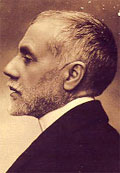 |
Manuel Teixeira Gomes
b. 27 May 1862, Vila Nova de Portimão, Portugal
d. 18 Oct 1941, Bougie, Algeria |
| Title: |
Presidente da República (President of the Republic) |
| Term: |
5 Oct 1923 - 11 Dec 1925 |
| Chronology: |
6 Aug 1923,
elected, session of the Congresso da República (Congress of the Republic), Palácio do Congresso (São Bento), Lisbon [1] |
|
5 Oct 1923,
made an affirmation required by law at the ceremony of installation as President of the Republic, session of the Congress, Palácio do Congresso (São Bento), Lisbon [2] |
|
11 Dec 1925, letter of resignation (dated 10 Dec 1925) communicated to the Congresso da República, acknowledged; session of the Congress, Palácio do Congresso (São Bento), Lisbon [3] |
| Biography: |
Attended the Colégio de São Luís Gonzaga, Portimão, and the Coimbra seminary; at the age of 15 enrolled at the University of Coimbra to study medicine; abandoned studies in two years and moved to Lisbon, where he established closed ties with local intellectual circles; after completing military service, installed himself in Porto (1881), where published a magazine; was engaged in fruit trade, holding a position in the family business; earned popularity by publishing a number of books written in the naturalist style; as a convinced republican, he collaborated with the daily A Lucta published by Brito Camacho; served as envoy to the United Kingdom (1911-1918); managed to ingratiate himself thoroughly with the British government and especially with King George V; acted as principal negotiator for all matters relating to Portugal and World War I; returned to Portugal in January 1918 and was put under house arrest during the dictatorship of Sidónio Pais; returned to diplomacy after the fall of Sidonist regime; became envoy to Spain (1919) and then again to the United Kingdom (1919-1923); a member of the Portuguese Delegation at the Paris Peace Conference (1919-1920); unsuccessful candidate of the Democratic Party (Partido Democrático) at the presidential elections of 6 Aug 1919 won by António José de Almeida; delegate to the League of Nations, serving as Vice-President of the General Assembly (6 Sep 1922 - 30 Sep 1922); was elected in-absentia President of the Republic (6 Aug 1923), arriving at the port of Lisbon on 3 Oct 1923; made unsuccessful attempts to combat terrorism; suppressed at least four major revolts (1924-1925) organized by radicals and the military; being constantly attacked by the nationalists and unable to manage political crises, he resigned the office (11 Dec 1925) on the pretext of poor health; went into voluntary exile (17 Dec 1925) and never returned to Portugal. Biography source: [4][5] |
| Elections: |
| Candidate |
Vote (6 Aug 1923) |
| |
1st ballot |
2nd ballot |
3rd ballot |
| Manuel Teixeira Gomes |
108 |
114 |
121 |
| Bernardino Luís Machado Guimarães |
73 |
71 |
5 |
| Duarte Leite Pereira da Silva |
3 |
1 |
— |
| Augusto Luís Vieira Soares |
2 |
2 |
— |
| Sebastião de Magalhães Lima |
1 |
— |
— |
| blank |
10 |
9 |
68 |
| total votes cast |
197 |
197 |
194 |
|
| The official account published in Diario do Congresso (Sessão N.° 9. Em 6 de Agosto de 1923. P. 4) omits the exact number of votes cast for Manuel Teixeira Gomes and Bernardino Luís Machado Guimarães on first balllot held between 16:15 and 17:10 6 Aug 1923, confirming only that they received the majority of votes ("Os candidatos mais votados foram os Srs. Manuel Teixeira Gomes, e Bernardino Luís Machado Guimarães.") It was also reported that Augusto Luís Vieira Soares received 1 vote.
The results of the first ballot in the table are as reported in "Portugal da Monarquia para a República", coord. by A.H. de Oliveira Marques, in Nova História de Portugal, vol. XI (Lisboa: Editorial Presência, 1991) |
| Election results: [1] |
| |
| [1] |
Diario do Congresso. Sessão N.° 9. Em 6 de Agosto de 1923. PP. 4-5. |
| [2] |
Diario do Congresso. Sessão N.° 10. Em 5 de Outubro de 1923. P. 4. |
| [3] |
Diário do Congresso. Sessão N.° 1. Em 11 de Dezembro de 1925. PP. 8-13. |
| [4] |
"Os presidentes e os governos da república no século XX", by Alberto Laplaine Guimarães... [et al.] (Lisboa: Caixa Geral de Depósitos, Imprensa Nacional - Casa da Moeda, 2000) |
| [5] |
"Os Presidentes da República Portuguesa", coord. by António Costa Pinto and Maria Inácia Rezola (Lisboa: Temas & Debates, 2001) |

